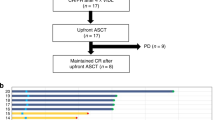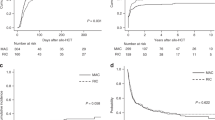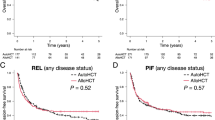Abstract
A dose-intensified multi-agent chemotherapy regimen called VCAP-AMP-VECP was investigated in Japan as front-line therapy for patients with adult T-cell leukemia-lymphoma (ATL). Although a prospective randomized controlled study showed that VCAP-AMP-VECP was superior to CHOP, the trial was rather small and no subsequent studies confirmed the benefit of VCAP-AMP-VECP over CHOP. We conducted a retrospective analysis of transplant-eligible patients with ATL who received only VCAP-AMP-VECP or CHOP, incorporating inverse probability of treatment weighting (IPTW) using propensity scoring. Overall, 947 and 513 patients were treated with VCAP-AMP-VECP and CHOP, respectively. The median follow-up of surviving patients was 1006 days. The crude probabilities of 2-year overall survival (OS) for patients in the VCAP-AMP-VECP and CHOP groups were 31.2% and 24.6%, respectively (P < 0.001). Stratified by risk group according to the modified ATL-prognostic index score at diagnosis, the crude probabilities of 2-year OS in the VCAP-AMP-VECP and CHOP groups were 39.8 and 45.0% in the low-risk group (P = 0.69), 32.2 and 21.6% in the intermediate-risk group (P < 0.001), and 17.2 and 6.2% in the high-risk group (P = 0.005). Our current analysis suggests that VCAP-AMP-VECP regimen is a preferable front-line therapy in patients with aggressive ATL in intermediate- and high-risk groups.
This is a preview of subscription content, access via your institution
Access options
Subscribe to this journal
Receive 12 print issues and online access
$259.00 per year
only $21.58 per issue
Buy this article
- Purchase on Springer Link
- Instant access to full article PDF
Prices may be subject to local taxes which are calculated during checkout


Similar content being viewed by others
References
Ishitsuka K, Tamura K. Human T-cell leukaemia virus type I and adult T-cell leukaemia-lymphoma. Lancet Oncol. 2014;15:e517–e526.
Fuji S, Yamaguchi T, Inoue Y, Utsunomiya A, Moriuchi Y, Uchimaru K, et al. Development of a modified prognostic index for patients with aggressive adult T-cell leukemia-lymphoma aged 70 years or younger: possible risk-adapted management strategies including allogeneic transplantation. Haematologica. 2017;102:1258–65.
Fukushima T, Nomura S, Shimoyama M, Shibata T, Imaizumi Y, Moriuchi Y, et al. Japan Clinical Oncology Group (JCOG) prognostic index and characterization of long-term survivors of aggressive adult T-cell leukaemia-lymphoma (JCOG0902A). Br J Haematol. 2014;166:739–48.
Malpica L, Pimentel A, Reis IM, Gotuzzo E, Lekakis L, Komanduri K, et al. Epidemiology, clinical features, and outcome of HTLV-1-related ATLL in an area of prevalence in the United States. Blood Adv. 2018;2:607–20.
Bazarbachi A, Plumelle Y, Carlos Ramos J, Tortevoye P, Otrock Z, Taylor G, et al. Meta-analysis on the use of zidovudine and interferon-alfa in adult T-cell leukemia/lymphoma showing improved survival in the leukemic subtypes. J Clin Oncol. 2010;28:4177–83.
Bazarbachi A, Cwynarski K, Boumendil A, Finel H, Fields P, Raj K, et al. Outcome of patients with HTLV-1-associated adult T-cell leukemia/lymphoma after SCT: a retrospective study by the EBMT LWP. Bone Marrow Transplant. 2014;49:1266–8.
Fuji S, Kurosawa S, Inamoto Y, Murata T, Utsunomiya A, Uchimaru K et al. Role of up-front allogeneic hematopoietic stem cell transplantation for patients with aggressive adult T-cell leukemia-lymphoma: a decision analysis. Bone Marrow Transplant. 2018;53:905–8.
Fuji S, Inoue Y, Utsunomiya A, Moriuchi Y, Uchimaru K, Choi I, et al. Pretransplantation anti-CCR4 antibody mogamulizumab against adult T-cell leukemia/lymphoma is associated with significantly increased risks of severe and corticosteroid-refractory graft-versus-host disease, nonrelapse mortality, and overall mortality. J Clin Oncol. 2016;34:3426–33.
Yamada Y, Tomonaga M, Fukuda H, Hanada S, Utsunomiya A, Tara M, et al. A new G-CSF-supported combination chemotherapy, LSG15, for adult T-cell leukaemia-lymphoma: Japan Clinical Oncology Group Study 9303. Br J Haematol. 2001;113:375–82.
Tsukasaki K, Utsunomiya A, Fukuda H, Shibata T, Fukushima T, Takatsuka Y, et al. VCAP-AMP-VECP compared with biweekly CHOP for adult T-cell leukemia-lymphoma: Japan Clinical Oncology Group Study JCOG9801. J Clin Oncol. 2007;25:5458–64.
Tsukasaki K, Hermine O, Bazarbachi A, Ratner L, Ramos JC, Harrington W Jr., et al. Definition, prognostic factors, treatment, and response criteria of adult T-cell leukemia-lymphoma: a proposal from an international consensus meeting. J Clin Oncol. 2009;27:453–9.
Robins JM, Hernan MA, Brumback B. Marginal structural models and causal inference in epidemiology. Epidemiology. 2000;11:550–60.
Makiyama J, Imaizumi Y, Tsushima H, Taniguchi H, Moriwaki Y, Sawayama Y, et al. Treatment outcome of elderly patients with aggressive adult T cell leukemia-lymphoma: Nagasaki University Hospital experience. Int J Hematol. 2014;100:464–72.
Ishida T, Jo T, Takemoto S, Suzushima H, Uozumi K, Yamamoto K, et al. Dose-intensified chemotherapy alone or in combination with mogamulizumab in newly diagnosed aggressive adult T-cell leukaemia-lymphoma: a randomized phase II study. Br J Haematol. 2015;169:672–82.
Acknowledgements
Authors contributions
S.F., T.Y., Y.I., and T.F. participated in research design, data analysis, and manuscript writing. A.U., Y.M., S.O., T.M., Y.S., E.O., and S.Y. gathered the data. All authors approved the submission of this manuscript.
Author information
Authors and Affiliations
Corresponding author
Ethics declarations
Conflict of interest
S.F. received honoraria from the Kyowa Hakko Kirin Co., Ltd.; T.Y. had ownership interests of Statcom Co., Ltd., received consulting fees from Ono Pharmaceutical Co., Ltd., honoraria from Taiho Pharmaceutical Co., Ltd., and research funding from Kyowa Hakko Kirin Co., Ltd.; and A.U. received honoraria from Kyowa Hakko Kirin, Daiichi Sankyo, Siemens, Bristol-Myers Squibb, Pfizer, Novartis Pharma, Nippon Shinyaku, Mundi Pharma, Chugai Pharma, Ono Pharmaceutical CO, Eisai, Celgene, JIMRO, and Otsuka Pharmaceutical.
Additional information
Publisher’s note: Springer Nature remains neutral with regard to jurisdictional claims in published maps and institutional affiliations.
Supplementary information
Rights and permissions
About this article
Cite this article
Fuji, S., Yamaguchi, T., Inoue, Y. et al. VCAP-AMP-VECP as a preferable induction chemotherapy in transplant-eligible patients with aggressive adult T-cell leukemia-lymphoma: a propensity score analysis. Bone Marrow Transplant 54, 1399–1405 (2019). https://doi.org/10.1038/s41409-019-0446-z
Received:
Revised:
Accepted:
Published:
Issue Date:
DOI: https://doi.org/10.1038/s41409-019-0446-z
This article is cited by
-
Current and emerging therapeutic strategies in adult T-cell leukemia–lymphoma
International Journal of Hematology (2023)
-
Prognostic impact of TP53 mutation, monosomal karyotype, and prior myeloid disorder in nonremission acute myeloid leukemia at allo-HSCT
Bone Marrow Transplantation (2021)



